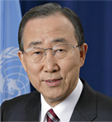The role of the Secretary-General
"As far as the nature of the Secretary-General’s personality is concerned, I feel that he should be the kind of man who looks to the future, a futurist, and has a global conception of problems. I do not believe in the importance of regional considerations in the choice of a Secretary-General. I do not believe that only an Asian or an African or a Latin American or a European should be the next Secretary-General. What I believe in are the qualities of the head as well of the heart, like moral integrity, competence, and his ability to project into the future, to act within the framework of a global unit, and a genuine desire to see his Organization develop into a really effective instrument for peace, justice and progress."
Love and compassion
"Wars begin in the minds of men, and in those minds love and compassion would have built the defences of peace."
"The law of love and compassion for all living creatures is again a doctrine to which we are all too ready to pay slip service. However, if it is to become a reality, it requires a process of education, a veritable mental renaissance. Once it has become a reality, national as well as international problems will fall into perspectives and become easier to solve. Wars and conflicts, too, will then become a thing of the past, because wars begin in the minds of men, and in those minds love and compassion would have built the defenses of peace."

Selflessness and non-egoism
"To be egoistic is to be blind to the needs, and the reality, of others. In addition, egoism is bad for oneself because it does not exist for long by itself. It becomes in course of time, the parent of the twin sins of pride and prestige. If there is one lesson that history teaches us, it is that wealth and power, pride and prestige, are not only transitory but even illusory."
"It is understandable that the major powers should pursue objectives which seem to them to be in their own national interest; but they should not be blind to the existence of a larger goal, the common interest of all countries, larger and small, in the survival of the human race. They should, at least occasionally, pause to reflect on the course of history, which has seen the rise and fall of so many great empires. Generations to come will judge the conduct of those in positions of authority today by the effect that their actions had on the course of human peace and progress. If they wish to have an honored place in human history they must appear as men of peace and not as mere victors in war."

Universal principle of truth
"Many of the problems that we face today are due to, or the result of, false attitudes – some of them have been adopted unconsciously. Amongst these is the concept of narrow nationalism – ‘my country, right or wrong’. It is lack of truth in international relations that leads to the conscious or unconscious adoption of double standards. It is therefore essential that, in international relations as in human relations, we should practice, as we preach to others, the universal principle of truth. "
Non-violence
"The principle of non-violence is also a basic concept of the Charter. One of the most fundamental principles to which Member States have committed themselves is to refrain in their international relations from the threat or use of force. History teaches us that no durable solution can be found for any human problem except by persuasion and by common consent. The use of violence is double-edged, as violence is bound by the doctrine of reciprocal action, to provoke violence in turn. Before long, we find that the rule of law has given place to the rule of the jungle. We have therefore to go back to first principles and to observe the Charter commitment regarding the non-use of violence or the threat of violence in international relations."
* The quotes on this page are from Muller, R. (1977). The Example of a Great Ethical Statesman: U Thant. New York: Agni Press (printed as a special supplement to the United Nations Meditation Group Bulletin).

